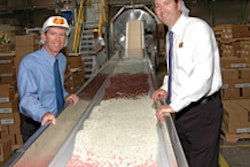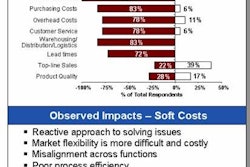The world's most powerful economy is in peril thanks to another bout of deception, denial, greed and collusion. Two powerful forces — the pressure to continually grow earnings coupled with wildly competitive markets supercharged by the Internet — have revealed a fissure a mile wide in CEO morality, leadership and management skills.
What happened at Washington Mutual that caused its collapse? And what was going on at Chase that has allowed them to prosper in the mortgage loan crisis? The price of those who failed will affect every American, so I believe we must understand the root cause.
Pressure to grow quarterly earnings demands organizations continually improve performance — and one of a CEO's most important jobs is to put in place an engine to drive that performance. If the CEO's expectation is that everyone works harder as opposed to smarter, the top has set the tone. When the organization honors and rewards the top performer based purely on numbers — without regard to how they were achieved — the real moral expectations are revealed. Competitive pressures are great at revealing every ethically gray twist and turn, and, after awhile, normally ethically people begin to question their own sense of right or wrong. When we set out moral compass by looking at what our competitors are doing we're in trouble.
The Internet has done nothing but heighten the competitive pressure, but it also has added another dynamic. The Web has created the era of mass customization; today as buyers we have many more sellers to choose from, and so, to compete, the sellers customize their solutions to meet our needs. Competing in this environment demands flexibility, and that flexibility comes in many forms. I believe in the mortgage crises competitive pressures were so great that mortgage loan professionals began to "look the other way" with regards to financial qualifications of their buyers — after all, everyone else was doing it.
So how does the pressure to make earnings combined with the mass customization realities of the Internet point to a failure in CEO morality, leadership and management? It's pretty simple: It's their job to understand these sophisticated dynamics and to lead their companies through the maze.
I believe the pressure to grow earnings each quarter, combined with a mass customization marketplace, demands a new kind of organizational thinking on the part of the CEO — not only to succeed competitively, but also to do so while living up to decent set of moral standards. The failing, I believe, is rooted deeply in outdated leadership and managerial practices.
Leaders are obligated today to create a healthy "being" environment for their organizations. Well-crafted values won't suffice — the key is the environment the leader creates through his or her own behavior. Contradictory behavior by the CEO, or tolerance of it, reverberates as truth through the organization. Additionally leaders must manage the "doing" environment. To ensure ethical behavior is in place in their managerial capacity leaders must create a managerial system where appropriate controls establish the boundaries of actions to ensure business effectiveness and ethical responsibility.
In the end, the credit crisis is the direct result of leadership not effectively creating a culture of ethical action and system of management that demands accountability. While the words are there, the look-the-other way ethic that lives up and down the corporation's layers is the direct responsibility of its leader. The credit crisis was caused by a leadership lapse of epic proportions.
What happened at Washington Mutual that caused its collapse? And what was going on at Chase that has allowed them to prosper in the mortgage loan crisis? The price of those who failed will affect every American, so I believe we must understand the root cause.
Pressure to grow quarterly earnings demands organizations continually improve performance — and one of a CEO's most important jobs is to put in place an engine to drive that performance. If the CEO's expectation is that everyone works harder as opposed to smarter, the top has set the tone. When the organization honors and rewards the top performer based purely on numbers — without regard to how they were achieved — the real moral expectations are revealed. Competitive pressures are great at revealing every ethically gray twist and turn, and, after awhile, normally ethically people begin to question their own sense of right or wrong. When we set out moral compass by looking at what our competitors are doing we're in trouble.
The Internet has done nothing but heighten the competitive pressure, but it also has added another dynamic. The Web has created the era of mass customization; today as buyers we have many more sellers to choose from, and so, to compete, the sellers customize their solutions to meet our needs. Competing in this environment demands flexibility, and that flexibility comes in many forms. I believe in the mortgage crises competitive pressures were so great that mortgage loan professionals began to "look the other way" with regards to financial qualifications of their buyers — after all, everyone else was doing it.
So how does the pressure to make earnings combined with the mass customization realities of the Internet point to a failure in CEO morality, leadership and management? It's pretty simple: It's their job to understand these sophisticated dynamics and to lead their companies through the maze.
I believe the pressure to grow earnings each quarter, combined with a mass customization marketplace, demands a new kind of organizational thinking on the part of the CEO — not only to succeed competitively, but also to do so while living up to decent set of moral standards. The failing, I believe, is rooted deeply in outdated leadership and managerial practices.
Leaders are obligated today to create a healthy "being" environment for their organizations. Well-crafted values won't suffice — the key is the environment the leader creates through his or her own behavior. Contradictory behavior by the CEO, or tolerance of it, reverberates as truth through the organization. Additionally leaders must manage the "doing" environment. To ensure ethical behavior is in place in their managerial capacity leaders must create a managerial system where appropriate controls establish the boundaries of actions to ensure business effectiveness and ethical responsibility.
In the end, the credit crisis is the direct result of leadership not effectively creating a culture of ethical action and system of management that demands accountability. While the words are there, the look-the-other way ethic that lives up and down the corporation's layers is the direct responsibility of its leader. The credit crisis was caused by a leadership lapse of epic proportions.









